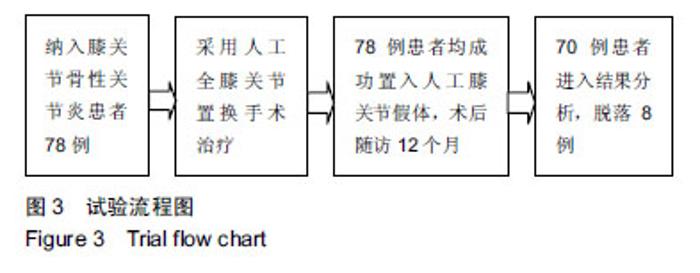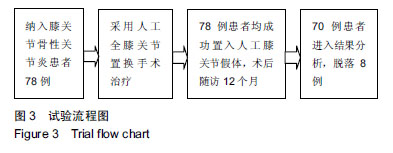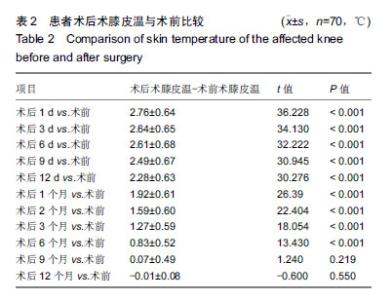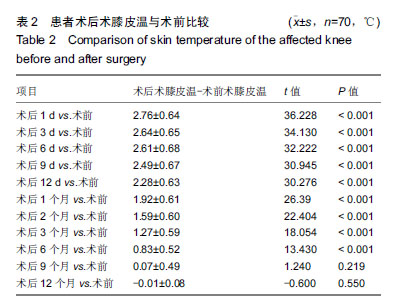Chinese Journal of Tissue Engineering Research ›› 2019, Vol. 23 ›› Issue (24): 3773-3779.doi: 10.3969/j.issn.2095-4344.1287
Correlation of local skin temperature of knee joint with C-reactive protein, interleukin 6 and erythrocyte sedimentation rate after primary unilateral total knee arthroplasty
Zang Wenhao1, Song Jian2, Teng Xueren3, Zhang Qiliang3
- 1Shandong First Medical University, Taian 271000, Shandong Province, China; 2Department of Orthopedics, Rizhao City Juxian Hospital of Chinese Medicine, Rizhao 276800, Shandong Province, China; 3Department of Bone Joint and Sports Medicine, Eastern Branch of Qingdao Municipal Hospital, Qingdao 266000, Shandong Province, China
-
Online:2019-08-28Published:2019-08-28 -
Contact:Zhang Qiliang, MD, Associate chief physician, Department of Bone Joint and Sports Medicine, Eastern Branch of Qingdao Municipal Hospital, Qingdao 266000, Shandong Province, China -
About author:Zang Wenhao, Master candidate, Shandong First Medical University, Taian 271000, Shandong Province, China
CLC Number:
Cite this article
Zang Wenhao, Song Jian, Teng Xueren, Zhang Qiliang. Correlation of local skin temperature of knee joint with C-reactive protein, interleukin 6 and erythrocyte sedimentation rate after primary unilateral total knee arthroplasty[J]. Chinese Journal of Tissue Engineering Research, 2019, 23(24): 3773-3779.
share this article

2.3 基线资料及不良事件 70例患者中女45例,男25例;症状在右膝者37例,在左膝者33例;平均身高(161.7± 3.6)cm,平均体质量(68.9±2.5)kg,病程平均(7.5±1.7)年。整个研究期间患者均无术后并发症发生。 2.4 置换前后健膝与患膝皮温变化情况 术前患膝的平均皮肤温度为35.13 ℃,健膝平均皮肤温度为35.10 ℃。术前的温度差异为(0.03±0.30) ℃。配对样本t 检验显示术前患膝与健膝皮肤温度差异无显著性意义(t=0.760,P=0.450)。 术后术膝皮肤温度升高并明显高于健膝,术后第1天术膝皮肤温度达到峰值37.89 ℃,显著高于术前(t=36.228,P < 0.001)。此后术膝皮温在术后1年内逐步下降,术后3个月时术膝温度下降至36.39 ℃,较术前水平略高(t= 18.054,P < 0.001);术后6个月时术膝皮温降至35.96 ℃,仍然高于术前水平(t=13.430,P < 0.001);于术后9个月时术膝皮温恢复至术前水平,术后9个月随访数据与术前皮温差异无显著性意义(t=1.240,P=0.219);术后12个月随访数据与术前皮温差异亦无显著性意义(t=-0.600,P=0.550)。术膝皮温波动见图4。"
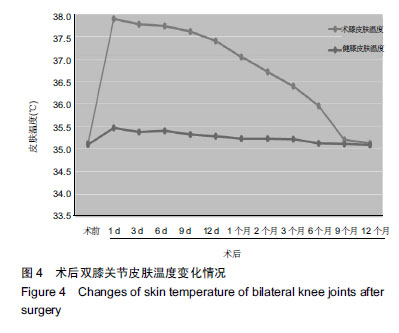
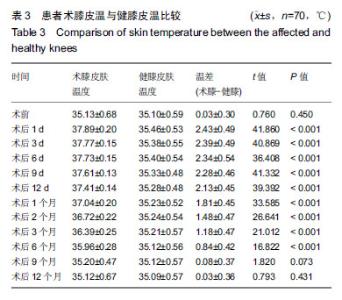
2.5 置换前后健膝与患膝温度差值变化 术前患膝的平均皮肤温度为35.13 ℃,健膝平均皮肤温度为35.10 ℃,术前的温度差异无显著性意义(t=0.760,P=0.450)。术后第1天时术膝皮肤温度升高达到峰值,与健膝的皮温差异达到峰值,为(2.43±0.49) ℃(t=41.860,P < 0.001)。并在随后的随访慢慢下降,平均皮温差异于术后1个月时逐渐下降至(1.81±0.45) ℃(t=33.585,P < 0.001);于2个月时降至(1.48±0.47) ℃(t=26.641,P < 0.001);于3个月时降至(1.18±0.47) ℃(t=21.012,P < 0.001);于6个月时降至(0.84±0.42) ℃(t=16.822,P < 0.001);9个月时降至(0.08±0.37) ℃(t=1.820,P=0.073);在12个月时平均差异为(0.03±0.36) ℃(t=0.793,P=0.431),详见表3,术后温差变化见图5。"
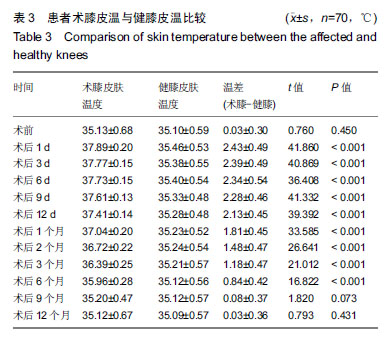
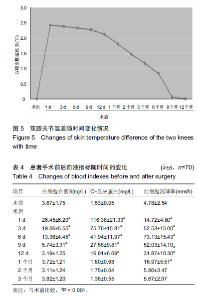
2.6 术后C-反应蛋白、白细胞介素6水平及红细胞沉降率变化趋势 见表4。 如表4所示,术前所有患者白细胞介素6、C-反应蛋白、红细胞沉降率水平均处于正常水平。白细胞介素6与C-反应蛋白均在术后1 d达到峰值,红细胞沉降率于术后6 d达到峰值。 白细胞介素6于术后快速上升,并于术后第1天达到峰值(26.45±6.20)ng/L;随后其水平快速下降,于术后12 d时降至正常值范围内(3.19±1.25)ng/L,与术前差异无显著性意义(t=-1.789,P=0.078);术后1,2,3个月白细胞介素6水平与术前相比差异均无显著性意义(P > 0.05)。 C-反应蛋白同样于术后快速上升,于术后第1天达到峰值(116.38±21.33)mg/L;随后C-反应蛋白水平在术后逐渐下降,并于术后1个月时降至正常范围内(1.80± 0.68)mg/L,与术前差异无显著性意义(t=1.931,P=0.058);术后2,3个月C-反应蛋白水平与术前相比差异均无显著性意义(P > 0.05)。 相比C-反应蛋白与白细胞介素6的快速变化,红细胞沉降率则相对较慢。红细胞沉降率术后升高较缓慢,于术后第6天达到峰值(73.13±15.43)mm/h;随后其下降速度也相对较缓慢,于术后2个月恢复至正常范围,与术前水平差异无显著性意义(t=1.970,P=0.053)。 2.7 皮温与C-反应蛋白、白细胞介素6、红细胞沉降率的关系 见表3,4。 术后患膝皮肤温度较健侧显著升高,于术后第1天达到峰值,并在随后1年的随访过程中逐渐下降,于术后第9个月恢复至术前水平,术后第9个月与术后第12个月皮温与术前差异无显著性意义(P > 0.05)。 术后C-反应蛋白、白细胞介素6、红细胞沉降率变化与皮温呈现类似变化趋势,术后均较术前水平显著升高,C-反应蛋白、白细胞介素6反应较迅速,于术后第1天达到峰值,红细胞沉降率反应相对缓慢,于术后第6天达到峰值。而后随皮温逐渐下降,C-反应蛋白、白细胞介素6、红细胞沉降率同样呈现出下降的趋势,白细胞介素6下降速度较快,于术后12 d降至正常值范围内;C-反应蛋白于术后1个月时降至正常值范围内;红细胞沉降率下降速度相对较慢,于术后2个月时降至正常范围内。 2.8 植入物与宿主的生物相容性 膝关节假体生物相容性良好,所有患者均未出现植入物周围感染、过敏反应、免疫反应及排斥反应。"
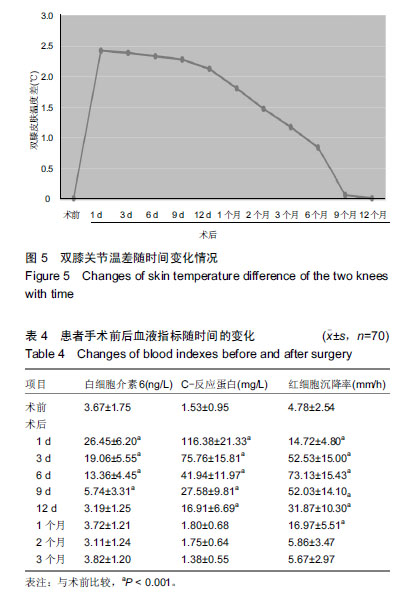
| [1] 鲁经纬,徐志宏,陈东阳,等.关节镜下治疗伴有半月板撕裂、游离体的膝关节骨关节炎的临床疗效分析[J].中华骨与关节外科杂志,2015,8(2):112-115.[2] Shaw JA,Chung R. Febrile response after knee and hip arthroplasty. Clin Orthop Relat Res. 1999;367:181-189.[3] Moreschini O, Greggi G, Giordano MC, et al. Postoperative physiopathological analysis of inflammatory parameters in patients undergoing hip or knee arthroplasty. Int J Tissue React. 2001;23(4):151-154.[4] Parvizi J, Chanem E, Menashe S, et al. Periprosthetic infection: what are the diagnostic challenges. Bone Joint Surg Am. 2006; 88:138-147.[5] 马风龙,沈明球,刘俊昌,等.膝关节骨性关节炎治疗观察[J].实用中医药杂志,2012,28(9):774-775.[6] 赵晨西,刘明远.膝关节骨性关节炎的治疗进展[J].湖南中医杂志, 2018,34(11):191-194.[7] Mullaji A, Lingaraju AP, Shetty GM. Computer-assisted total knee replacement in patients with arthritis and a recurvatum deformity. J Bone Joint Surg Br. 2012;94(5):642-647.[8] Huang GY, Xia J, Wang Q, et al. Total knee arthroplasty using trochlear groove as guide for position of femoral component in severe knee osteoarthritis. BMC Surg. 2016; 16(1):33.[9] Kester BS, Minhas SV, Vigdorchik JM, et al. Total knee arthroplasty for posttraumatic osteoarthritis: Is it time for a new classification. Arthroplasty. 2016;31(8):1649-1653.[10] Del Pozo JL,Patel R. Clinical practice. Infection associated with prosthetic joints. N Engl J Med. 2009;361(8):787-794.[11] 周振宇. 髋膝关节置换术后假体周围感染预防和治疗的相关研究[D].苏州:苏州大学,2016.[12] 张鑫,李慧娟,周亮,等. 人工关节置换术后感染的预防、诊断和治疗研究进展[J]. 实用药物与临床,2016,19(5):639-643.[13] Luthringer TA, Fillingham YA, Okroj K, et al. Periprosthetic joint infection after hip and knee arthroplasty:a review for emergency care providers. Ann Emerg Med. 2016;68(3): 324-334.[14] Weiser MC, Moucha CS. The current state of screening and decolonization for the prevention of Staphylococcus aureus surgical site infection after total hip and knee arthroplasty. J Bone Joint Surg Am. 2015;97(17):1449-1458.[15] Richardson AB, Bala A, Wellman SS, et al. Perioperative dexamethasone administration does not increase the incidence of postoperative infection in total hip and knee arthroplasty: a retrospective analysis. J Arthroplasty. 2016; 31(8):1784-1787.[16] Ticinesi A, Lauretani F, Nouvenne A, et al. C-reactive protein (CRP) measurement in geriatric patients hospitalized for acute infection. Eur J Int Med. 2017;37:7-12. [17] Athanassious C, Samad A, Avery A, et al. Evaluation of fever in the immediate postoperative period in patients who underwent total joint arthroplasty. J Arthroplasty. 2011;26(8): 1404-1408. [18] Patel R, Alijanipour P, Parvizi J. Advancements in diagnosing periprosthetic joint infections after total hip and knee arthroplasty. Open Orthop J. 2016;10:654-661.[19] De Vecchi E,Romanò CL,De Grandi R,et al. Alpha defensin, leukocyte esterase, C-reactive protein, and leukocyte count in synovial fluid for pre-operative diagnosis of periprosthetic infection. Int J Immunopathol Pharmacol. 2018;(32): 2058738418806072.[20] Lee YS,Koo KH,Kim HJ,et al.Synovial Fluid Biomarkers for the Diagnosis of Periprosthetic Joint Infection: A Systematic Review and Meta-Analysis. J Bone Joint Surg Am. 2017; 99(24):2077-2084.[21] 王利,陆琳松,殷剑,等.联合检测降钙素原、血沉、C-反应蛋白在膝关节置换术后感染的临床意义[J].中华关节外科杂志(电子版), 2014,8(5):585-588.[22] 张林,李剑峰.膝关节感染患者6种感染指标水平的检验结果分析[J].国际检验医学杂志,2017,38(16):2213-2215.[23] 梁峰,许晓军,姚强,等.全膝关节置换术后CRP和ESR变化的临床研究[J].中国骨与关节损伤杂志,2014,29(1):73-74.[24] Romanò CL, D'Anchise R, Calamita M, et al. Value of digital telethermography for the diagnosis of septic knee prosthesis: a prospective cohort study. BMC Musculoskelet Disord. 2013;14: 7.[25] Ring EF, Dieppe PA, Bacon PA. The thermographic assessment of inflammation and anti-inflammatory drugs in osteoarthritis. Br J Clin Pract. 1981;35(7-8):263-264.[26] Haidar SG, Charity RM, Bassi RS, et al. Knee skin temperature following uncomplicated total knee arthroplasty. Knee. 2006;13:422-426.[27] Kristiansson M,Soop M,Sundqvist KG, et al. Local vs. systemic immune and haemostatic response to hip arthroplasty. Eur J Anaesthesiol.1998;15(3):260-270.[28] Mehra A, Langkamer VG, Day A, et al. C reactive protein and skin temperature post total knee arthroplasty. Knee. 2005; 12(4):297-301.[29] Sibbald RG, Muiti A, Amstrong DG. Infrared skin thermometry: an underutilized cost-effective tool for routine wound care practice and patient high-risk diabetic foot self-monitoring. Adv Skin Wound Care. 2015;28(1):37-44.[30] Fierheller M, Sibbald RG. A clinical investigation into the relationship between increased periwound skin temperature and local wound infection in patients with chronic leg ulcers. Adv Skin Wound Care. 2010;23(8):369-379.[31] Mumingjiang Y, Zhou X, He R. Value of knee skin temperature measured by infrared thermography and soluble intercellular adhesion molecule-1 in the diagnosis of peri-prosthetic knee infection in Chinese individuals following total knee arthroplasty. Chin Med J (Engl). 2014;127(17):3105-3109. |
| [1] | Wei Wei, Li Jian, Huang Linhai, Lan Mindong, Lu Xianwei, Huang Shaodong. Factors affecting fall fear in the first movement of elderly patients after total knee or hip arthroplasty [J]. Chinese Journal of Tissue Engineering Research, 2021, 25(9): 1351-1355. |
| [2] | Wang Jinjun, Deng Zengfa, Liu Kang, He Zhiyong, Yu Xinping, Liang Jianji, Li Chen, Guo Zhouyang. Hemostatic effect and safety of intravenous drip of tranexamic acid combined with topical application of cocktail containing tranexamic acid in total knee arthroplasty [J]. Chinese Journal of Tissue Engineering Research, 2021, 25(9): 1356-1361. |
| [3] | Chai Le, Lü Jianlan, Hu Jintao, Hu Huahui, Xu Qingjun, Yu Jinwei, Quan Renfu. Signal pathway variation after induction of inflammatory response in rats with acute spinal cord injury [J]. Chinese Journal of Tissue Engineering Research, 2021, 25(8): 1218-1223. |
| [4] | Zhao Zhongyi, Li Yongzhen, Chen Feng, Ji Aiyu. Comparison of total knee arthroplasty and unicompartmental knee arthroplasty in treatment of traumatic osteoarthritis [J]. Chinese Journal of Tissue Engineering Research, 2021, 25(6): 854-859. |
| [5] | Liu Shaohua, Zhou Guanming, Chen Xicong, Xiao Keming, Cai Jian, Liu Xiaofang. Influence of anterior cruciate ligament defect on the mid-term outcome of fixed-bearing unicompartmental knee arthroplasty [J]. Chinese Journal of Tissue Engineering Research, 2021, 25(6): 860-865. |
| [6] | Zhang Nianjun, Chen Ru. Analgesic effect of cocktail therapy combined with femoral nerve block on total knee arthroplasty [J]. Chinese Journal of Tissue Engineering Research, 2021, 25(6): 866-872. |
| [7] | Yuan Jun, Yang Jiafu. Hemostatic effect of topical tranexamic acid infiltration in cementless total knee arthroplasty [J]. Chinese Journal of Tissue Engineering Research, 2021, 25(6): 873-877. |
| [8] | Li Yan, Wang Pei, Deng Donghuan, Yan Wei, Li Lei, Jiang Hongjiang. Electroacupuncture for pain control after total knee arthroplasty: a meta-analysis [J]. Chinese Journal of Tissue Engineering Research, 2021, 25(6): 957-963. |
| [9] | Ma Rui, Wang Jialin, Wu Mengjun, Ge Ying, Wang Wei, Wang Kunzheng. Relationship of pathogenic bacteria distribution with drug resistance and treatment cycle for periprosthetic joint infection after total joint arthroplasty [J]. Chinese Journal of Tissue Engineering Research, 2021, 25(3): 380-385. |
| [10] | Ruan Guangping, Yao Xiang, Liu-Gao Miyang, Cai Xuemin, Li Zian, Pang Rongqing, Wang Jinxiang, Pan Xinghua. Umbilical cord mesenchymal stem cell transplantation for traumatic systemic inflammatory response syndrome in tree shrews [J]. Chinese Journal of Tissue Engineering Research, 2021, 25(25): 3994-4000. |
| [11] | Wang Dasai, Zhang Yang, Cheng Yin, Wang Qiang. Efficacy and safety of staged versus simultaneous unicompartmental knee arthroplasty: a meta-analysis#br# [J]. Chinese Journal of Tissue Engineering Research, 2021, 25(24): 3929-3936. |
| [12] | Yu Yinghao, Zhao Jijun, Liu Dongcheng, Chen Yuhao, Feng Dehong. Clinical significance of preoperative planning assisted unicompartmental knee arthroplasty with digital imaging system for fixed-bearing prosthesis [J]. Chinese Journal of Tissue Engineering Research, 2021, 25(21): 3324-3331. |
| [13] | Deng Zhibo, Li Zhi, Wu Yahong, Mu Yuan, Mu Yuexi, Yin Liangjun. Local infiltration anesthesia versus femoral nerve block for pain control and safety after total knee arthroplasty: a meta-analysis [J]. Chinese Journal of Tissue Engineering Research, 2021, 25(21): 3401-3408. |
| [14] | Mieralimu•Muertizha, Ainiwaerjiang•Damaola, Lin Haishan, Wang Li . Relationship between tibio-femoral mechanical axis deviation on coronal plane and early joint function recovery after total knee arthroplasty [J]. Chinese Journal of Tissue Engineering Research, 2021, 25(21): 3300-3304. |
| [15] | Liao Yuan, Qu Mengjian, Liu Jing, Zhong Peirui, Zeng Yahua, Wang Ting, Xiao Hao, Li Lan, Liu Danni, Yang Lu, Zhou Jun. Effects of ultrashort wave on inflammatory response in rats with acute lung injury [J]. Chinese Journal of Tissue Engineering Research, 2021, 25(2): 253-257. |
| Viewed | ||||||
|
Full text |
|
|||||
|
Abstract |
|
|||||
